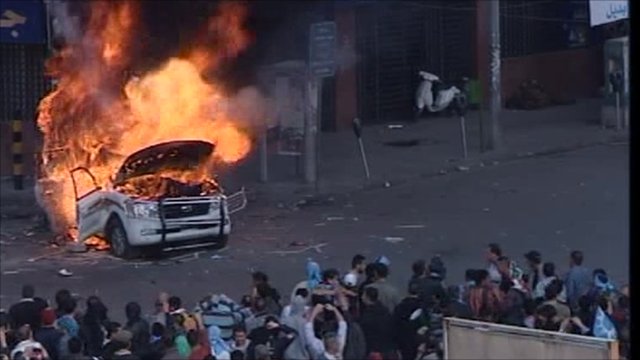 Lebanon's president has appointed Najib Mikati, who is backed by the Shia Islamist group Hezbollah and its allies, as prime minister-designate.
Lebanon's president has appointed Najib Mikati, who is backed by the Shia Islamist group Hezbollah and its allies, as prime minister-designate.
The move came despite demonstrations by thousands of supporters of outgoing Prime Minister Saad Hariri in the city of Tripoli as part of a "day of rage".
Smaller protests were also reported in the capital, Beirut, and elsewhere. Mr Hariri has condemned acts of violence.
Analysts say many Sunnis are alarmed by Hezbollah's growing political power.
They accuse the Iran-backed group of staging a "coup", because it brought down the Western-backed government earlier this month after a row over the UN tribunal investigating the 2005 murder of Mr Hariri's father, Rafik. Reports say Hezbollah figures will be implicated.
The US government has also said it would have "great concerns about a government within which Hezbollah plays a leading role".
'Moderate'
During consultations with President Michel Suleiman on Tuesday, 68 out of 125 members of parliament expressed support for Mr Mikati, a billionaire Sunni businessman who served briefly as premier in 2005.
After his appointment, Mr Mikati said he hoped the new government would serve all of Lebanon, and protect its unity and sovereignty.
"This does not signal the victory of one camp over another," he told reporters. "This is the victory of consensus over difference."
He said nothing justified the refusal of any political party to participate in the next government, adding: "My hand is extended to all Lebanese."
"I look forward to seeing the new government act as one that faces... all the challenges awaiting us and one that lives up to aspirations and hopes of the Lebanese people."
Under Lebanon's power-sharing system, the post of prime minister is reserved for a Sunni, while the president must be a Maronite Christian and the speaker of parliament a Shia.
Earlier, Mr Mikati told the BBC that although he needed the votes of Hezbollah, he remained independent of the movement.
"I am not at all related to Hezbollah by any means," he told the BBC. "I am a moderate politician. I am always at equal distance from everybody."
Hezbollah's leader, Sheikh Hassan Nasrallah, meanwhile urged him to form a coalition including all political and sectarian factions.
"We have supported the nomination of... Mikati and we call on him to form a national partnership government. The Lebanese have a chance to close ranks," he told thousands of supporters in Baalbek via videolink.
Streets blocked
Earlier, Mr Hariri went on television to appeal for calm as thousands of his supporters staged street protests against the appointment.
TV pictures from the predominantly Sunni city of Tripoli - Mr Mikati's hometown - on Tuesday morning showed an angry crowd waving banners and holding aloft pictures of Mr Hariri and his father, and tearing down posters of the new prime minister-designate.
Medical sources said 20 people had been injured, and protesters set alight a satellite truck used by al-Jazeera TV.
Schools and shops in the Tripoli area had closed down, following similar protests on Monday.
Protests were also reported in Beirut, where crowds blocked streets, and in the southern coastal city of Sidon.
In his speech, Mr Hariri thanked "every free citizen" who had "denounced the attempts of hegemony over our national citizens".
"But it is also my duty to express my total rejection of all forms of rioting and acts of law-breakers who have accompanied these demonstrations," he said.
Mr Hariri, who has refused to join any Hezbollah-led administration, also said he deeply regretted the attack on al-Jazeera's vehicle.
The protesters' anger is fuelled by the fact that they appear to have been outmanoeuvred by Hezbollah, says the BBC's Kevin Connolly in Beirut.
Although this crisis was triggered by allegations that Hezbollah figures were involved in Rafik Hariri's murder, it appears to be resulting in greater power in the group's hands, our correspondent says.
The question now, he adds, is what kind of prime minister Mr Mikati will be, and what kind of government he will head.



